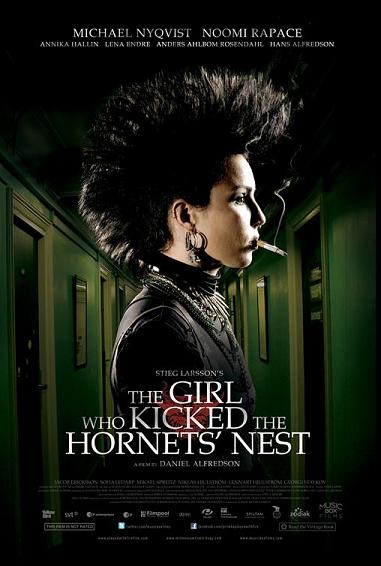
The Girl Who Kicked The Hornet's Nest is the third in the series of novels and films begun with The Girl With The Dragon Tattoo (reviewed previouly). As with the first film, I came into this intrigued by the almost universal praise I'd heard for the film, and series as a whole. I caught up by watching the second film, The Girl Who Played With Fire, first though. Which is good, otherwise I would have been very confused as these two seem more like one story broken into two parts, so Fire directly leads into Hornet's Nest.
On a whole, I think this is a better film than Dragon Tattoo, mostly because it is nowhere near as slow to get going. Unfortunately it seems to still suffer from some rather sloppy storytelling, which is something that bothered me about the first film. In this film we have a character who was introduced in Fire; he serves no purpose, and brings nothing, to this story. But, because his arc was not closed at the end of that one, he shows up a few times throughout this one, to remind us he exists, before they have to add 10-15 minutes to the end of the movie, after the conflict has been resolved, to take care of him. A similar problem that Dragon Tattoo had.
I like the courtroom drama aspect of this film more than the crime/investigation stories of the previous two. For one thing, we've had this central character, Lisbeth Salander, who we haven't gotten to know much and finally, now, we get to actually focus on, and learn about, her. In the first one, we're introduced to her and she's interesting and complicated but we don't end up learning, or knowing, much about her. In the second, she becomes the subject of a conspiracy, but still, we don't learn much about her, except her father is an evil man. It takes until this third film for us to actually get insight into her.
It feels as though it's inefficient storytelling. One of the things that comes to play here, at long last, is one of the problems I had with the beginning of the first film – a subplot between Lisbeth and her guardian. Was that purposefully set up then for use now? Or is it just taking advantage of something that was already there? If it was a set up, why then and there, at the beginning of the first film when it has no bearing on that story? Why slow down the first film solely for the purposes of this one? If it's just taking advantage of something that was there, well, why was it there in the first place? There has to be a better way of giving us the information needed. You can hint at it in the first film then flesh it out later in the second and/or third when it actually has some meaning to the story.
I also have a problem with just believing this story, no matter how much I liked it. In order to keep Lisbeth from talking about her father, a Russian defector protected by a forgotten underground group (yeah, the government just happened to forget about it, how convenient), this group sends her, twelve years-old at the time, to a mental institution headed by a corrupt doctor involved with said group. They torture her and have her declared unfit, thus why, as an adult, she has a legal guardian. I have a problem with this because it would seem to me that, in order to keep someone quiet, a corrupt group would just have that person killed. It's in their power, they kill other people, and they're not good people who would seem to have a problem with killing a twelve year-old girl. A conspiracy seems much too complicated, just kill them and be done with it. So everything that ends up happening feels like convenient twists, turns and complications merely for the sake of twists, turns and complications rather than what makes sense for the story and characters. It's as though a bunch of ideas were tossed in a bowl and whenever something was needed, one was picked at random.
It's unfortunate because it is good, I don't want that to get lost in here. If I could walk away from any of these films without thinking 'there just has to be a better way to do this,' they'd be closer to great, and that's what's so frustrating. But this messy, inefficient story keeps it firmly in the 'good' category - it has all the right parts (maybe a few too many), they're just not used properly. Not having read the novels, I can't say if it's a source material problem, but it would seem as though it must be. The only thing that I can't argue with is Noomi Rapace's performance as Lisbeth. It's outstanding. If for no other reason, watch the film, and the whole series, for that.
3 out of 5